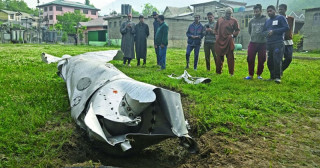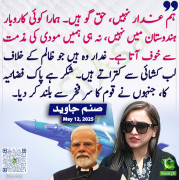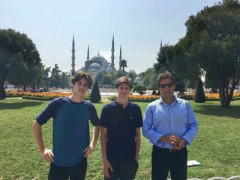ishwaq
Minister (2k+ posts)
Remembering the Prophet of mercy
Prophet Muhammad’s life, undoubtedly, leads to the conclusion that friend and foe equally shared his mercy.
Every year, the month of Rabi-ul-Awwal brings uppermost to the mind the auspicious event of the blissful birth of Holy Prophet Muhammad (peace be upon him). Prophet Abraham has beseeched Allah: “O our Rabb (Creator and Sustainer)! And raise among them a Messenger from among themselves who may recite to them Your verse, and teach them the Book and the Wisdom, and purify them.
Surely, You are the Mighty, the Wise.” — 2:129. And Prophet Jesus had proclaimed thus: “O children of Israel (Yaqoob)! Surely, I am the messenger of Allah to you confirming what was (revealed) before me of the Torah, and bearing glad tidings of a Messenger who shall come after me, whose name will be Ahmad.” — 61:6. The wish of Abraham was fulfilled. The good news given by Jesus was substantiated. Allah sent Prophet Muhammad (peace be upon him) to grace and glorify the earth and to guide the mankind on to be path of truth, righteousness and peace. Prophet Muhammad (peace be upon him) is the last apostle of Allah. His legacy unto us is the Holy Quran, which is the last and ever lasting Book of Allah.
He has left with us a perfect and universal faith for everybody and for all times to come. In addition, we have his Sunnah, which in fact, is the Holy Quran personified.
Allah has described Prophet Muhammad (peace be upon him) as all-embracing and all-pervading mercy. The Quran says: “And we have not sent you but as a mercy for the world.” — 21:107.
The above Quranic verse says in unambiguous terms that the Holy prophet (peace be upon him) was sent as a mercy not only to the believer, but to all creatures. This can best be understood if we have a correct and full appraisal of the prophetic mission. As commented by Maulana Abdul Majid Daryabadi, the four aspects of the Prophet’s mission are as follows:
I. He will recite and deliver to his people the revelation exactly as he receives and will, in the sense, be a trusted Divine Messenger;
2. He will not transmit the Message but will also expound, interpret and illustrate the Teaching he is commanded to impart, and would, in the phase of his life, be a Divine Teacher;
3. Besides explaining the many of the injunctions of the Divine Law, he will also unravel to the elect of his people the deeper significance of the Divine Wisdom, and will initiate them in the profundities of spirit and subtleties of soul. He will, on this account, be known as an exponent of Divine Wisdom, and;
4. He will, by his words and deeds, precept and practice, raise and uplift the moral tone of his people, will purge them of vice and immorality, and will make them pious and godly. He will in this capacity be called a Divine Reformer and Law-giver. The prophetic mission is further explained in the following verse: “O Prophet! Surely We have sent as a witness and (as) a bearer of glad tidings and a warner. And as one who calls (men) towards Allah by His glad tidings to the believers that a great bounty of Allah is in store for them.” — 33:45-47. The Prophet was sent by Allah in five capacities:
I. He comes as a witness to all men about the spiritual truths, which had been obscured by ignorance or superstitions or by the dust of sectarian controversy. He did not come to establish a new religion or sect. He came to teach religion. He is also a witness to Allah about men’s doings and how they receive Allah’s message.
2. He came as a bearer of the glad tidings of the mercy of Allah. No matter how far men may have transgressed, they have hope if they believe, repent and live a good life.
3. He also comes as a Warner to those who are headless. This life will not last. There is a future life, and that is all-important.
4. He comes as one who has right to invite all men to repentance and the forgiveness of sins: but he does this, not of his own authority, but by the permission and the authority given to him by Allah. This is said lest people may defy the Prophet as they did with other prophets before him.
5. The Prophet also came as a light or lamp (Siraj) to illuminate the whole world. The same word (Siraj) is used for the sun. The comparison is apt. When the sun appears, all the lesser lights pale before its light. And the Messenger of Islam, i.e. the Universal Religion, is to diffuse light everywhere.
In fact, the whole life of the Holy Prophet (peace be upon him) is full of examples of deeds of mercy. History bears witness that, despite all the provocations, the Prophet of Mercy exhibited extreme tolerance, forbearance and kindness. His whole life undoubtedly leads to the conclusion that friend and foe equally shared his mercy. We Muslims have bequeathed this mission of mercy. We are duty-bound to bring home to the world his noble traditions of mercy. In them lies the real peace.
Prophet Muhammad’s life, undoubtedly, leads to the conclusion that friend and foe equally shared his mercy.
Every year, the month of Rabi-ul-Awwal brings uppermost to the mind the auspicious event of the blissful birth of Holy Prophet Muhammad (peace be upon him). Prophet Abraham has beseeched Allah: “O our Rabb (Creator and Sustainer)! And raise among them a Messenger from among themselves who may recite to them Your verse, and teach them the Book and the Wisdom, and purify them.
Surely, You are the Mighty, the Wise.” — 2:129. And Prophet Jesus had proclaimed thus: “O children of Israel (Yaqoob)! Surely, I am the messenger of Allah to you confirming what was (revealed) before me of the Torah, and bearing glad tidings of a Messenger who shall come after me, whose name will be Ahmad.” — 61:6. The wish of Abraham was fulfilled. The good news given by Jesus was substantiated. Allah sent Prophet Muhammad (peace be upon him) to grace and glorify the earth and to guide the mankind on to be path of truth, righteousness and peace. Prophet Muhammad (peace be upon him) is the last apostle of Allah. His legacy unto us is the Holy Quran, which is the last and ever lasting Book of Allah.
He has left with us a perfect and universal faith for everybody and for all times to come. In addition, we have his Sunnah, which in fact, is the Holy Quran personified.
Allah has described Prophet Muhammad (peace be upon him) as all-embracing and all-pervading mercy. The Quran says: “And we have not sent you but as a mercy for the world.” — 21:107.
The above Quranic verse says in unambiguous terms that the Holy prophet (peace be upon him) was sent as a mercy not only to the believer, but to all creatures. This can best be understood if we have a correct and full appraisal of the prophetic mission. As commented by Maulana Abdul Majid Daryabadi, the four aspects of the Prophet’s mission are as follows:
I. He will recite and deliver to his people the revelation exactly as he receives and will, in the sense, be a trusted Divine Messenger;
2. He will not transmit the Message but will also expound, interpret and illustrate the Teaching he is commanded to impart, and would, in the phase of his life, be a Divine Teacher;
3. Besides explaining the many of the injunctions of the Divine Law, he will also unravel to the elect of his people the deeper significance of the Divine Wisdom, and will initiate them in the profundities of spirit and subtleties of soul. He will, on this account, be known as an exponent of Divine Wisdom, and;
4. He will, by his words and deeds, precept and practice, raise and uplift the moral tone of his people, will purge them of vice and immorality, and will make them pious and godly. He will in this capacity be called a Divine Reformer and Law-giver. The prophetic mission is further explained in the following verse: “O Prophet! Surely We have sent as a witness and (as) a bearer of glad tidings and a warner. And as one who calls (men) towards Allah by His glad tidings to the believers that a great bounty of Allah is in store for them.” — 33:45-47. The Prophet was sent by Allah in five capacities:
I. He comes as a witness to all men about the spiritual truths, which had been obscured by ignorance or superstitions or by the dust of sectarian controversy. He did not come to establish a new religion or sect. He came to teach religion. He is also a witness to Allah about men’s doings and how they receive Allah’s message.
2. He came as a bearer of the glad tidings of the mercy of Allah. No matter how far men may have transgressed, they have hope if they believe, repent and live a good life.
3. He also comes as a Warner to those who are headless. This life will not last. There is a future life, and that is all-important.
4. He comes as one who has right to invite all men to repentance and the forgiveness of sins: but he does this, not of his own authority, but by the permission and the authority given to him by Allah. This is said lest people may defy the Prophet as they did with other prophets before him.
5. The Prophet also came as a light or lamp (Siraj) to illuminate the whole world. The same word (Siraj) is used for the sun. The comparison is apt. When the sun appears, all the lesser lights pale before its light. And the Messenger of Islam, i.e. the Universal Religion, is to diffuse light everywhere.
In fact, the whole life of the Holy Prophet (peace be upon him) is full of examples of deeds of mercy. History bears witness that, despite all the provocations, the Prophet of Mercy exhibited extreme tolerance, forbearance and kindness. His whole life undoubtedly leads to the conclusion that friend and foe equally shared his mercy. We Muslims have bequeathed this mission of mercy. We are duty-bound to bring home to the world his noble traditions of mercy. In them lies the real peace.













































